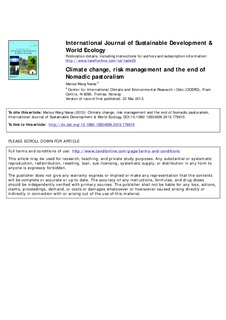| dc.contributor.author | Næss, Marius Warg | |
| dc.date.accessioned | 2017-11-09T17:02:34Z | |
| dc.date.available | 2017-11-09T17:02:34Z | |
| dc.date.created | 2013-02-06T10:30:56Z | |
| dc.date.issued | 2013 | |
| dc.identifier.citation | International Journal of Sustainable Development and World Ecology. 2013, 20 (2), 123-133. | nb_NO |
| dc.identifier.issn | 1350-4509 | |
| dc.identifier.uri | http://hdl.handle.net/11250/2465396 | |
| dc.description.abstract | Mobility has been argued to be the single factor explaining why some pastoralists do relatively well during extreme climatic events, while others do not, because mobility works by taking advantage of the spatial and temporal structure of resource failure by moving away from scarcity towards abundance. In spite of this, a common governmental management strategy is to resettle pastoral populations and thereby significantly reduce mobility. By revealing the underlying logic of mobility for Tibetan pastoralists, this paper questions official policy that aims at privatizing communally owned rangelands since it reduces pastoral flexibility and access to key resources. This is especially pertinent in the face of climate change. While little is known as to the specifics of how climate change will affect nomadic pastoralists, environmental variability is likely to increase. Consequently, policies resulting in decreased mobility may exacerbate the negative effects of climate change because of a positive feedback between climate and negative density dependence. | nb_NO |
| dc.language.iso | eng | nb_NO |
| dc.subject | Nomadisme | nb_NO |
| dc.subject | Nomadism | nb_NO |
| dc.subject | Tibet | nb_NO |
| dc.subject | Pastoralisme | nb_NO |
| dc.subject | Pastoralism | nb_NO |
| dc.title | Climate change, risk management and the end of Nomadic pastoralism | nb_NO |
| dc.type | Journal article | nb_NO |
| dc.type | Peer reviewed | nb_NO |
| dc.description.version | submittedVersion | nb_NO |
| dc.rights.holder | This is an Accepted Manuscript of an article published by Taylor & Francis in International Journal of Sustainable Development and World Ecology on 22 Mar 2013, available online: http://www.tandfonline.com/doi/full/10.1080/13504509.2013.779615 | nb_NO |
| dc.subject.nsi | VDP::Sosialantropologi: 250 | nb_NO |
| dc.subject.nsi | VDP::Social anthropology: 250 | nb_NO |
| dc.source.pagenumber | 123-133 | nb_NO |
| dc.source.volume | 20 | nb_NO |
| dc.source.journal | International Journal of Sustainable Development and World Ecology | nb_NO |
| dc.source.issue | 2 | nb_NO |
| dc.identifier.doi | 10.1080/13504509.2013.779615 | |
| dc.identifier.cristin | 1006952 | |
| dc.relation.project | Norges forskningsråd: 204174 | nb_NO |
| cristin.unitcode | 7475,0,0,0 | |
| cristin.unitname | CICERO Senter for klimaforskning | |
| cristin.ispublished | true | |
| cristin.fulltext | preprint | |
| cristin.qualitycode | 1 | |
